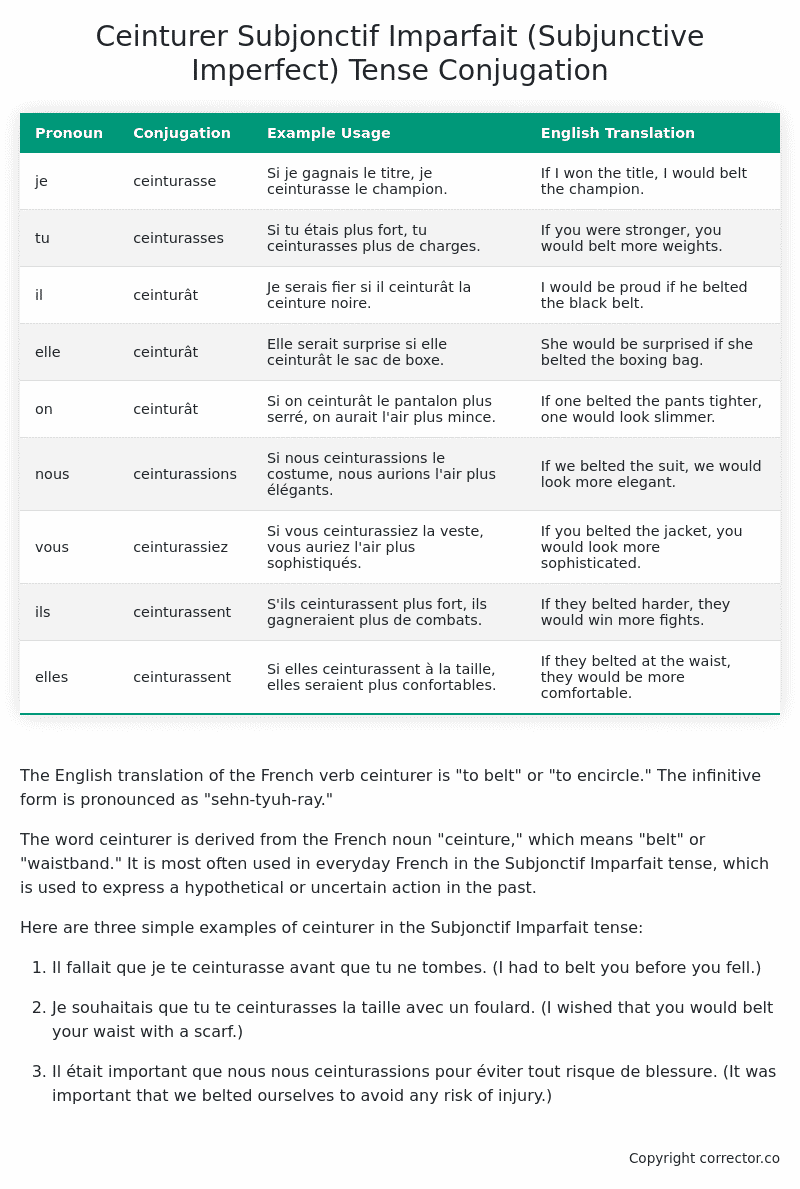Subjonctif Imparfait (Subjunctive Imperfect) Tense Conjugation of the French Verb ceinturer
Introduction to the verb ceinturer
The English translation of the French verb ceinturer is “to belt” or “to encircle.” The infinitive form is pronounced as “sehn-tyuh-ray.”
The word ceinturer is derived from the French noun “ceinture,” which means “belt” or “waistband.” It is most often used in everyday French in the Subjonctif Imparfait tense, which is used to express a hypothetical or uncertain action in the past.
Here are three simple examples of ceinturer in the Subjonctif Imparfait tense:
-
Il fallait que je te ceinturasse avant que tu ne tombes. (I had to belt you before you fell.)
-
Je souhaitais que tu te ceinturasses la taille avec un foulard. (I wished that you would belt your waist with a scarf.)
-
Il était important que nous nous ceinturassions pour éviter tout risque de blessure. (It was important that we belted ourselves to avoid any risk of injury.)
Table of the Subjonctif Imparfait (Subjunctive Imperfect) Tense Conjugation of ceinturer
| Pronoun | Conjugation | Example Usage | English Translation |
|---|---|---|---|
| je | ceinturasse | Si je gagnais le titre, je ceinturasse le champion. | If I won the title, I would belt the champion. |
| tu | ceinturasses | Si tu étais plus fort, tu ceinturasses plus de charges. | If you were stronger, you would belt more weights. |
| il | ceinturât | Je serais fier si il ceinturât la ceinture noire. | I would be proud if he belted the black belt. |
| elle | ceinturât | Elle serait surprise si elle ceinturât le sac de boxe. | She would be surprised if she belted the boxing bag. |
| on | ceinturât | Si on ceinturât le pantalon plus serré, on aurait l’air plus mince. | If one belted the pants tighter, one would look slimmer. |
| nous | ceinturassions | Si nous ceinturassions le costume, nous aurions l’air plus élégants. | If we belted the suit, we would look more elegant. |
| vous | ceinturassiez | Si vous ceinturassiez la veste, vous auriez l’air plus sophistiqués. | If you belted the jacket, you would look more sophisticated. |
| ils | ceinturassent | S’ils ceinturassent plus fort, ils gagneraient plus de combats. | If they belted harder, they would win more fights. |
| elles | ceinturassent | Si elles ceinturassent à la taille, elles seraient plus confortables. | If they belted at the waist, they would be more comfortable. |
Other Conjugations for Ceinturer.
Le Present (Present Tense) Conjugation of the French Verb ceinturer
Imparfait (Imperfect) Tense Conjugation of the French Verb ceinturer
Passé Simple (Simple Past) Tense Conjugation of the French Verb ceinturer
Passé Composé (Present Perfect) Tense Conjugation of the French Verb ceinturer
Futur Simple (Simple Future) Tense Conjugation of the French Verb ceinturer
Futur Proche (Near Future) Tense Conjugation of the French Verb ceinturer
Plus-que-parfait (Pluperfect) Tense Conjugation of the French Verb ceinturer
Passé Antérieur (Past Anterior) Tense Conjugation of the French Verb ceinturer
Futur Antérieur (Future Anterior) Tense Conjugation of the French Verb ceinturer
Subjonctif Présent (Subjunctive Present) Tense Conjugation of the French Verb ceinturer
Subjonctif Passé (Subjunctive Past) Tense Conjugation of the French Verb ceinturer
Subjonctif Imparfait (Subjunctive Imperfect) Tense Conjugation of the French Verb ceinturer (this article)
Subjonctif Plus-que-parfait (Subjunctive Pluperfect) Tense Conjugation of the French Verb ceinturer
Conditionnel Présent (Conditional Present) Tense Conjugation of the French Verb ceinturer
Conditionnel Passé (Conditional Past) Tense Conjugation of the French Verb ceinturer
L’impératif Présent (Imperative Present) Tense Conjugation of the French Verb ceinturer
L’infinitif Présent (Infinitive Present) Tense Conjugation of the French Verb ceinturer
Struggling with French verbs or the language in general? Why not use our free French Grammar Checker – no registration required!
Get a FREE Download Study Sheet of this Conjugation 🔥
Simply right click the image below, click “save image” and get your free reference for the ceinturer Subjonctif Imparfait tense conjugation!

Ceinturer – About the French Subjonctif Imparfait (Subjunctive Imperfect) Tense
Formation
Common Everyday Usage Patterns
Interactions with Other Tenses
Subjonctif Présent
Indicatif Passé Composé
Conditional
Conditional Perfect
Summary
I hope you enjoyed this article on the verb ceinturer. Still in a learning mood? Check out another TOTALLY random French verb conjugation!


